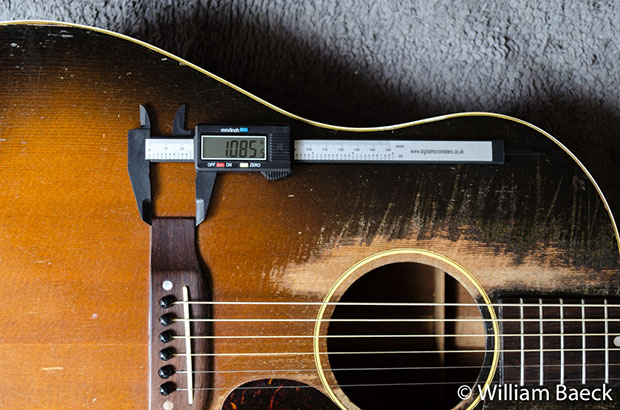The GAS Man: Should You Buy That Vintage Wreck? Part 3

There are a lot of things to think about when you’re considering buying a vintage guitar that needs major repairs.
Previously I talked about what it’s like to buy a busted vintage guitar and why you might want to. In part two I listed a few basics to consider in case you’re thinking of going this route yourself.
Here, in the final part of this three-part series, I’ll go over some questions you should ask your repairman—hopefully before you buy that guitar!
At a minimum, you should send detailed close-up pictures of the guitar to your repairman. But for the most accurate assessment you need to let him or her look it over in person so they can feel what’s loose, take measurements, etc. Allow time for your repairman to take the instrument to their workshop so they can examine it in detail without you staring over their shoulder.
With that in mind, here are some questions to ask your luthier and yourself regarding the repairs:
What kind of experience do they have in these kind of repairs?
The guy I chose worked on vintage acoustics all the time, as he was the repairman at a vintage guitar store. However, some folks specialize in replacing frets and doing basic setups but have far less experience in refinishing guitars or doing neck resets. Some specialize in acoustics and others in electrics. You need to check up on your prospective repairman’s area of expertise.
Get The Pick Newsletter
All the latest guitar news, interviews, lessons, reviews, deals and more, direct to your inbox!
What types of repairs are needed?
Some repairs are structural, some are cosmetic, and some are in between. For instance, can you get by with worn frets for another couple of years? Maybe a neck reset would give you perfect playability whereas a lowered saddle and lighter strings would give you acceptable playability, but not optimum tone. The difference in repair costs could be $400 vs. $40.
How much will it cost to repair/restore?
Decide what the guitar needs and what it will cost to fix. This might be an exact fee or a price range, as the repairman may not now how bad the problem is until the guitar is apart. Be sure to get a list of essential as well as the optional repairs. For instance, my guitar repairman could have hunted down an original 1950-era rosewood bridge for a few hundred bucks. Instead, on his suggestion, he lightly reshaped the existing replacement rosewood bridge to make it look much more like the original, as it bothered his personal sense of vintage aesthetics. Similarly we agreed he should touch up the heel where he added the missing wood, but not refinish the worn area around the sound hole, a more expensive proposition, especially on a guitar with a sunburst finish.
Are you doing repairs, restorations or modifications?
Sometimes, especially on vintage guitars, any repair that veers from originality affects the value. On the other hand, you can restore it look to vintage specs even if it’s functioning fine as is (for instance by replacing aftermarket tuners with vintage originals). Going the other direction, if it’s for you to play, not sell, this can be an opportunity to make the guitar more to your liking. You might try slightly bigger frets than vintage or a different pickup if the original is missing. However, consider that if it’s a vintage instrument, today’s reasonable mods can turn into tomorrow’s horror stories, so go lightly.
Is there room to bargain or barter?
Sometimes you can trade for repair work. Maybe you have two busted guitars—and can trade one toward repairing the other. Also it might be cheaper to have a whole set of repairs done all at once rather than piecemeal.
When can they start and how long will it take?
Good luthiers are likely to be booked up, and even moderate repairs can take weeks to complete. This might not be a great idea if it’s your only guitar.
Rather than have the guitar sit around their workshop, try and get a start and finish date. But realize that just because the guitar is ready to pick up doesn’t mean it’s completely finished.
In my own experience with my 1950 Gibson J-45, the repairman warned me that the nitro lacquer he used to touch up the heel repair would take a couple of months or so to fully harden and that I shouldn’t put the guitar in a case until then. While the finish was still relatively soft, even the felt lining from the case could leave marks. Take your repair person’s advice into account if you need to play the guitar as soon as possible.
Do you really require the most costly luthier?
Don’t hire a more expensive repairman than the work calls for. Some luthiers do high-end, specialty work. As a result they might command higher prices for all of their services, even the basic ones. Most of the estimates I got for repairing my J-45 ranged from around $600 to $800, except for one craftsman who’s estimate clocked in at $2,300. That’s because he builds guitars that sell for more than $10,000 and are visual, ergonomic and auditory works of art. His hourly rates reflected the time he’d spend fixing my guitar instead of building his.
In the end, itemize the proposed repairs and choose repairman and the repairs that make the most sense for you. Then you can decide if buying and repairing the guitar makes sense, factoring in the cost, hassle and what the guitar will be worth in its repaired state.
You might even be able to go back to the seller and use the info you’ve gained to negotiate a better price. When you bring back a faded old guitar to performing specs, it’s a great feeling for both you and the repairman.
A special thanks to Gerald Gill of No.Tom Guitars, who walked me through all these steps and repaired my J-45.
William Baeck is a writer, photographer and hack guitarist living in London. You can check out his webpage at williambaeck.com and reach him on Facebook and Twitter.
"Upgrading from your entry-level acoustic opens the door to an entirely new world of tonewoods, body shapes, and brands": 6 signs it's time to upgrade from your first acoustic guitar
"I'm past my prime": 5 common excuses for not learning the guitar – and 5 body and mind-boosting reasons you should









